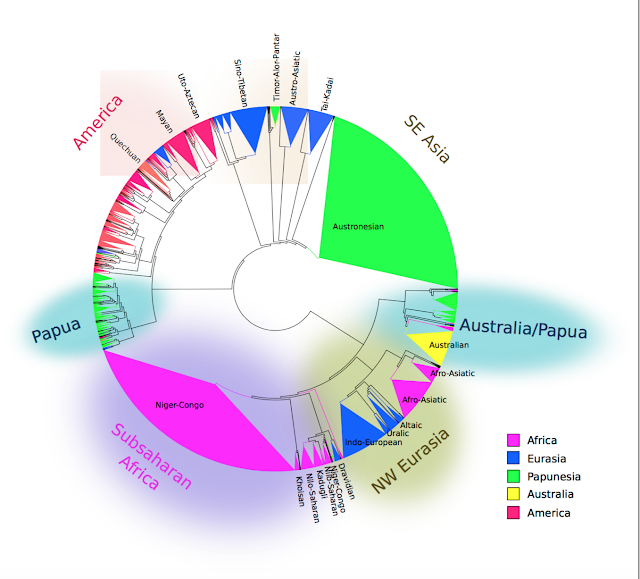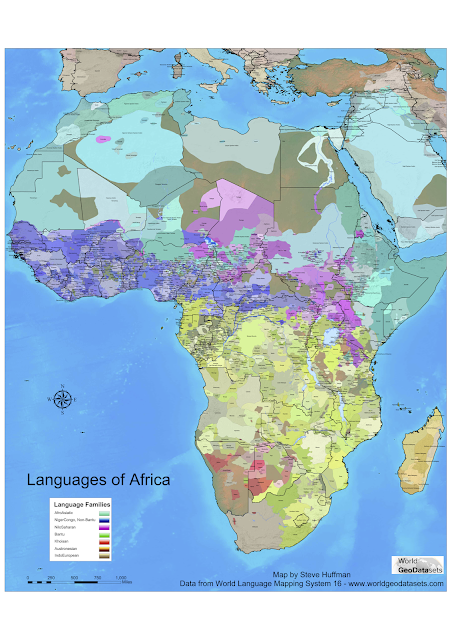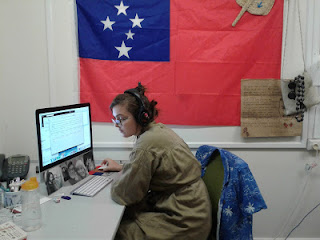More Open Access Publishing of Linguistic Descriptions!!
There's a new Open Access Publishing initiative in town: Endangered Languages Publishing!
There are now three (Platinum) Open Access publishing houses in linguistics: Language Science Press, Language Documentation & Conservation and Endangered Languages Publishing. There are others, the old houses are trying to keep up, but these three adopt a very radical version of Open Access: publications are free for both authors and readers ("Platinum OA").
Endangered languages publishing (EL publishing for short) was just recently founded by Peter Austin, David Nathan and Julia Sallabank. Their website has already had over 1900 visitors and among other things contains the latest volume of Language Documentation and Description (LDD 12 -- a special issue on documentation and archiving), an app dealing with Khoi-san languages, and the complete back catalog of LDD volumes 1 to 11.
David Nathan wrote a very good post on the PARADISEC blog about the first month of EL publishing, what Open Access is and what it means to linguistic research. If you are interested in linguistic description and the reality of the publishing world, you should read that blog post.
OA sceptics sometimes worry that the quality will not be high enough without the old big publishing houses machinery, but keep in mind that most scholars who edit, write or review for those houses already work for free. So why not gather those same people, apply for money from big grant agencies and/or crowdsources money to hire copywriters etc and keep it all OA? These initiatives listed above are for example keeping a very high quality by recruiting top names in the different fields, there is no need to assume that OA equals lower quality.
The funding agencies often prefer OA, DFG (German taxpayers) has for example funded Language Science Press and more and more grant bodies are demanding that the research their funding will be OA. If you want to read more about money flow in academic publishing and OA, I recommend reading this info from Language Science Press.
OA, and in particular in linguistic of anthropological fieldwork, is not unproblematic. There are issues that need to be discussed and addressed properly. As said before, I really recommend you reading Nathan's post but do also read Ruth Singers on OA and intimate fieldwork.
All of this really reminds me of the discussions we were having on tumblr a while back on the problem of "making fun" of natural utterances in linguistic descriptions and who should have access to linguistic data. If you are interested in these types of ethical issues in linguistic description and publishing I recommend following those links and the links onwards from there.
I write on this blog mainly for that the audience of curious and thoughtful tumblrers and young people interested in linguistics, like those who participate in the Linguistic Olympiads or young language nerds in general. I am a nerd and I know what it means to be able to share my interest with others on the internet and learn from each other. I am very happy that we are able to have these important discussions and that you are interested in these topics. Thank you for that.
There are now three (Platinum) Open Access publishing houses in linguistics: Language Science Press, Language Documentation & Conservation and Endangered Languages Publishing. There are others, the old houses are trying to keep up, but these three adopt a very radical version of Open Access: publications are free for both authors and readers ("Platinum OA").
Endangered languages publishing (EL publishing for short) was just recently founded by Peter Austin, David Nathan and Julia Sallabank. Their website has already had over 1900 visitors and among other things contains the latest volume of Language Documentation and Description (LDD 12 -- a special issue on documentation and archiving), an app dealing with Khoi-san languages, and the complete back catalog of LDD volumes 1 to 11.
David Nathan wrote a very good post on the PARADISEC blog about the first month of EL publishing, what Open Access is and what it means to linguistic research. If you are interested in linguistic description and the reality of the publishing world, you should read that blog post.
OA sceptics sometimes worry that the quality will not be high enough without the old big publishing houses machinery, but keep in mind that most scholars who edit, write or review for those houses already work for free. So why not gather those same people, apply for money from big grant agencies and/or crowdsources money to hire copywriters etc and keep it all OA? These initiatives listed above are for example keeping a very high quality by recruiting top names in the different fields, there is no need to assume that OA equals lower quality.
The funding agencies often prefer OA, DFG (German taxpayers) has for example funded Language Science Press and more and more grant bodies are demanding that the research their funding will be OA. If you want to read more about money flow in academic publishing and OA, I recommend reading this info from Language Science Press.
OA, and in particular in linguistic of anthropological fieldwork, is not unproblematic. There are issues that need to be discussed and addressed properly. As said before, I really recommend you reading Nathan's post but do also read Ruth Singers on OA and intimate fieldwork.
All of this really reminds me of the discussions we were having on tumblr a while back on the problem of "making fun" of natural utterances in linguistic descriptions and who should have access to linguistic data. If you are interested in these types of ethical issues in linguistic description and publishing I recommend following those links and the links onwards from there.
I write on this blog mainly for that the audience of curious and thoughtful tumblrers and young people interested in linguistics, like those who participate in the Linguistic Olympiads or young language nerds in general. I am a nerd and I know what it means to be able to share my interest with others on the internet and learn from each other. I am very happy that we are able to have these important discussions and that you are interested in these topics. Thank you for that.




Comments
Post a Comment